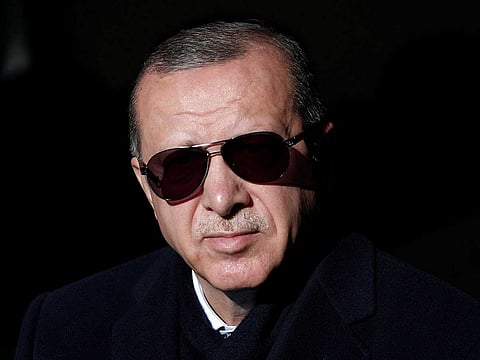Turkey biggest winner of US Syria withdrawal
‘Trump has in effect switched horses from Kurds to their arch-foe the Turks’

Washington: When President Donald Trump announced Wednesday that he was pulling US forces out of Syria, it came as a shock to much of Washington. Key US military officials reportedly felt hoodwinked by the drastic shift in policy; Trump’s secretary of defence quit. Counterterrorism experts warned that a departure could lead to a Daesh resurgence. Critics in the foreign-policy community declared that Trump was giving “a Christmas gift to our enemies” - namely Russia and Iran, whose influence the American presence in Syria was supposed to check.
In a Thursday morning tweetstorm, however, Trump swatted away such arguments. Rather than Washington being “the policeman of the Middle East,” he said, Russia, Iran and the Syrian regime could deal with extremists and other enemies on their own. In Moscow, Russian President Vladimir Putin voiced his agreement.
But there’s another power that could benefit even more from Trump’s strategic impatience: Turkey.
If the United States pulls out of Syria and - as has been reported - ceases air strikes against militant groups there, it will effectively abandon the Syrian Democratic Forces, the alliance of militias that is Washington’s proxy on the ground. The SDF now controls virtually all of northeastern Syria, something that has long infuriated Turkey: The main outfit within the alliance is the YPG, a Syrian Kurdish force with links to an outlawed Kurdish separatist movement in Turkey.
Earlier this year, the Turkish military invaded Syria, driving the YPG out of the country’s northwest. The Trump administration acquiesced; American units that once conducted joint patrols with SDF units began working with Turkish proxies. If Trump pulls out completely, expect Ankara to press its advantage. Turkish Defense Minister Hulusi Akar threatened as much on Thursday, saying his government was preparing for an offensive to bury the YPG and its allies “in their trenches.”
Syrian Kurds must now balance the tricky fight against Daesh with this new existential threat. “So far, our forces are still fighting these battles against terrorism,” Mustafa Bali, an SDF spokesman, told the New York Times. “We will do all that we can do to continue the battle, but the US decision was unfortunate and unexpected.”
Trump’s decision may have been spurred on directly by Turkish President Recep Tayyip Erdogan. As Karen DeYoung [of Washington Post] reported, Trump made the determination to draw the United States out of Syria after a Friday phone call with his Turkish counterpart.
“Officials familiar with the Friday call said that Erdogan, among other things, had stressed to Trump that the Syrian Kurds were terrorists - allied with Kurdish separatists in his own country - and asked why the United States was supporting them rather than its NATO ally,” wrote DeYoung. “He noted that Daesh had been vanquished and questioned the need for an ongoing US troop presence, saying that Turkish troops already massed on the Syrian border could handle any problem there.” Trump, who campaigned on bringing American troops home, was apparently all too eager to follow Erdogan’s advice.
“Trump has in effect switched horses from the Kurds to their arch-foe the Turks,” wrote the Guardian’s Martin Chulov. “And in doing so, he has doubled down on a new phase in the regional war, the essence of which is letting Daesh off the hook in order to take on a more pressing enemy.”
Now attention shifts to what form Turkey’s onslaught will take, whether a small operation to create a new buffer zone in Syria or a campaign to eliminate the YPG altogether.
This marks a huge turn in Ankara’s fortunes. Over the course of the war in Syria, Turkey has been both a clumsy meddler and calamitous bystander. Erdogan was once bent on the removal of Syrian President Bashar Assad and tacitly enabled support for rebel militias and extremist groups fighting Assad’s regime. Blowback came in the form of terrorist attacks on Turkish soil and millions of desperate Syrian refugees crossing the border in search of sanctuary. Moscow’s 2015 intervention in the war dashed whatever hopes Ankara had of guiding its endgame.
Erdogan has since come to terms with Assad remaining in power. And now, argues Soner Cagaptay of the Washington Institute for Near East Policy, he may have secured a more influential place at the table as Assad tightens his control. “Turkey is a big winner,” Cagaptay told Today’s WorldView. “Erdogan will weaken and pressure the YPG and then allow Assad to gobble it up.”
Alternatively, the Syrian Kurds may now make common cause with the Assad regime, shelving their aspirations for autonomy in return for a patron who might shield them from destruction. The Trump administration has already signaled its apathy if the Kurds choose that path: On Monday, the US envoy to Syria flatly declared that Washington will not have “permanent relationships with substate entities.”
While many in Washington lament yet another American “betrayal” of Kurds in the Middle East, aid groups have other concerns. They worry that an intense Turkish offensive in an area already scarred by war could spark a new humanitarian crisis.
“Families are struggling to get their lives back on track, and many are still reliant on vital aid,” said Mark Schnellbaecher, Middle East regional director of the International Rescue Committee. “The major powers involved in Syria must consider the humanitarian consequences of all planning decisions.”
If Trump did consider these implications before announcing his withdrawal, he certainly hasn’t shown it.



